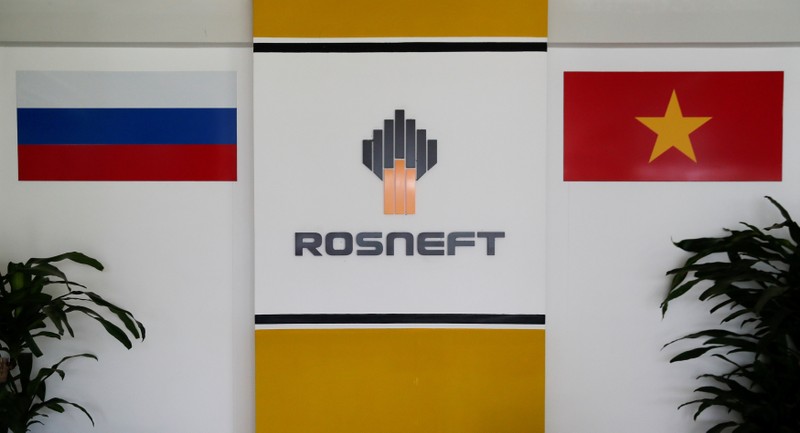
FILE PHOTO: The logo of Russia’s oil company Rosneft is pictured at the Rosneft Vietnam office in Ho Chi Minh City, Vietnam April 26, 2018. REUTERS/Maxim Shemetov/File Photo
May 17, 2018
By James Pearson
HANOI (Reuters) – Rosneft Vietnam BV, a unit of Russian state oil firm Rosneft <ROSN.MM>, is concerned that its recent drilling in an area of the South China Sea that is claimed by China could upset Beijing, two sources with direct knowledge of the situation told Reuters on Wednesday.
Rosneft said on Tuesday its Vietnamese unit had started drilling at the LD-3P well, part of the Lan Do “Red Orchid” offshore gas field in Block 06.1, 370 kms (230 miles) southeast of Vietnam.
The block is “within the area outlined by China’s nine-dash line,” according to energy consultancy and research firm Wood Mackenzie.
China’s U-shaped “nine-dash line” marks a vast expanses of the South China Sea that it claims, including large swathes of Vietnam’s Exclusive Economic Zone. Maps of the area indicate the block is around 85 kms (53 miles) inside the contested area.
A series of dashes, the line is not continuous making China’s claims often ambiguous. In recent years, though, China has increasingly patrolled and enforced the area, claiming historic rights to the resources and features within it.
In March, Vietnam halted an oil drilling project in the nearby “Red Emperor” block following pressure from China, sources told Reuters. [nL3N1R53ME]
That block is licensed to Spanish energy firm Repsol <REP.MC>, which has asked Vietnam to pay compensation over the issue. [nL8N1SB3JA]
The Vietnamese foreign ministry did not respond to a request from Reuters for comment.
China’s foreign ministry did not respond to a faxed request for comment late on Wednesday.
Russia’s foreign ministry did not respond to a request for comment. Rosneft declined to comment.
Fearing repercussions and pressure from China, Rosneft Vietnam had wanted to begin drilling with as little attention as possible, despite the statement by its parent company on Tuesday, the sources said.
PETROVIETNAM WARNED OVER PRODUCTION
The drilling in the “Red Orchid” gas field within the block will be undertaken using the “Hakuryu-5” equipment made by Japanese company Japan Drilling Co., Ltd <1606.T>, Rosneft said in that statement.
The Hakuryu-5 arrived in the disputed area on May 6, according to Thomson Reuters Eikon ship tracking data and was still recorded as being inside the block late on Wednesday.
The drilling is significant for Vietnam, which has been struggling to maintain its crude oil and gas output amid already declining production from its key fields and the continuing pressure from China in the disputed waters.
In April, Vietnam’s state oil firm PetroVietnam said that maritime tensions with China will hurt its offshore exploration and production activities this year. [nL4N1RG2OX]
Hanoi and Beijing have long been embroiled in disputes over the maritime boundary, which is a politically sensitive issue in Vietnam.
Police in the central province of Khanh Hoa have launched an investigation into a group of Chinese tourists who were pictured in a local airport wearing T-shirts printed with a map showing the “nine-dash line”, state media reported on Wednesday.
Airport authorities asked the tourists, who arrived at Cam Ranh Airport on Sunday, to take off their T-shirts after going through customs, the Van Hoa (Culture) newspaper reported.
(Additional reporting by Khanh Vu; Editing by Martin Howell)

